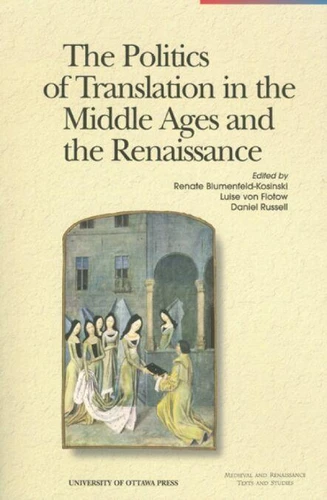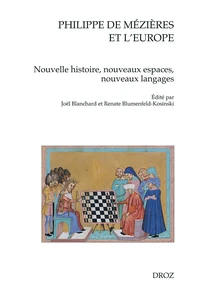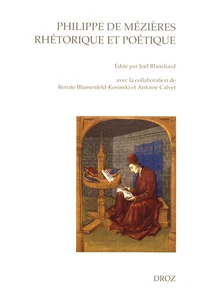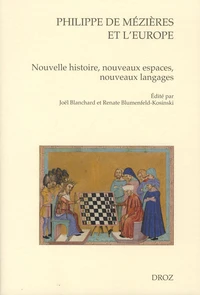The Politics of Translation in the Middle Ages and the Renaissance
Par : , ,Formats :
Disponible dans votre compte client Decitre ou Furet du Nord dès validation de votre commande. Le format ePub est :
- Compatible avec une lecture sur My Vivlio (smartphone, tablette, ordinateur)
- Compatible avec une lecture sur liseuses Vivlio
- Pour les liseuses autres que Vivlio, vous devez utiliser le logiciel Adobe Digital Edition. Non compatible avec la lecture sur les liseuses Kindle, Remarkable et Sony
 , qui est-ce ?
, qui est-ce ?Notre partenaire de plateforme de lecture numérique où vous retrouverez l'ensemble de vos ebooks gratuitement
Pour en savoir plus sur nos ebooks, consultez notre aide en ligne ici
- Nombre de pages224
- FormatePub
- ISBN0-7766-1974-8
- EAN9780776619743
- Date de parution07/03/2001
- Protection num.pas de protection
- Taille829 Ko
- Infos supplémentairesepub
- ÉditeurUniversity of Ottawa Press
Résumé
The articles in this collection focus on politics in the widest sense and its influence and visibility in translations from the early Middle Ages to the late Renaissance. The articles in this collection, written by medievalists and Renaissance scholars, are part of the recent "cultural turn" in translation studies, which approaches translation as an activity that is powerfully affected by its socio-political context and the demands of the translating culture.
The links made between culture, politics, and translation in these texts highlight the impact of ideological and political forces on cultural transfer in early European thought. While the personalities of powerful thinkers and translators such as Erasmus, Etienne Dolet, Montaigne, and Leo Africanus play into these texts, historical events and intellectual fashions are equally important: moments such as the Hundred Years War, whose events were partially recorded in translation by Jean Froissart; the Political tussles around the issues of lay readers and rewriters of biblical texts; the theological and philosophical shift from scholasticism to Renaissance relativism; or European relations with the Muslim world add to the interest of these articles.
Throughout this volume, translation is treated as a form of writing, as the production of text and meaning, carried out in a certain cultural and political ambiance, and for identifiable - though not always stated - reasons. No translation, this collection argues, is an innocent, transparent rendering of the original. Published in English.
The links made between culture, politics, and translation in these texts highlight the impact of ideological and political forces on cultural transfer in early European thought. While the personalities of powerful thinkers and translators such as Erasmus, Etienne Dolet, Montaigne, and Leo Africanus play into these texts, historical events and intellectual fashions are equally important: moments such as the Hundred Years War, whose events were partially recorded in translation by Jean Froissart; the Political tussles around the issues of lay readers and rewriters of biblical texts; the theological and philosophical shift from scholasticism to Renaissance relativism; or European relations with the Muslim world add to the interest of these articles.
Throughout this volume, translation is treated as a form of writing, as the production of text and meaning, carried out in a certain cultural and political ambiance, and for identifiable - though not always stated - reasons. No translation, this collection argues, is an innocent, transparent rendering of the original. Published in English.
The articles in this collection focus on politics in the widest sense and its influence and visibility in translations from the early Middle Ages to the late Renaissance. The articles in this collection, written by medievalists and Renaissance scholars, are part of the recent "cultural turn" in translation studies, which approaches translation as an activity that is powerfully affected by its socio-political context and the demands of the translating culture.
The links made between culture, politics, and translation in these texts highlight the impact of ideological and political forces on cultural transfer in early European thought. While the personalities of powerful thinkers and translators such as Erasmus, Etienne Dolet, Montaigne, and Leo Africanus play into these texts, historical events and intellectual fashions are equally important: moments such as the Hundred Years War, whose events were partially recorded in translation by Jean Froissart; the Political tussles around the issues of lay readers and rewriters of biblical texts; the theological and philosophical shift from scholasticism to Renaissance relativism; or European relations with the Muslim world add to the interest of these articles.
Throughout this volume, translation is treated as a form of writing, as the production of text and meaning, carried out in a certain cultural and political ambiance, and for identifiable - though not always stated - reasons. No translation, this collection argues, is an innocent, transparent rendering of the original. Published in English.
The links made between culture, politics, and translation in these texts highlight the impact of ideological and political forces on cultural transfer in early European thought. While the personalities of powerful thinkers and translators such as Erasmus, Etienne Dolet, Montaigne, and Leo Africanus play into these texts, historical events and intellectual fashions are equally important: moments such as the Hundred Years War, whose events were partially recorded in translation by Jean Froissart; the Political tussles around the issues of lay readers and rewriters of biblical texts; the theological and philosophical shift from scholasticism to Renaissance relativism; or European relations with the Muslim world add to the interest of these articles.
Throughout this volume, translation is treated as a form of writing, as the production of text and meaning, carried out in a certain cultural and political ambiance, and for identifiable - though not always stated - reasons. No translation, this collection argues, is an innocent, transparent rendering of the original. Published in English.









